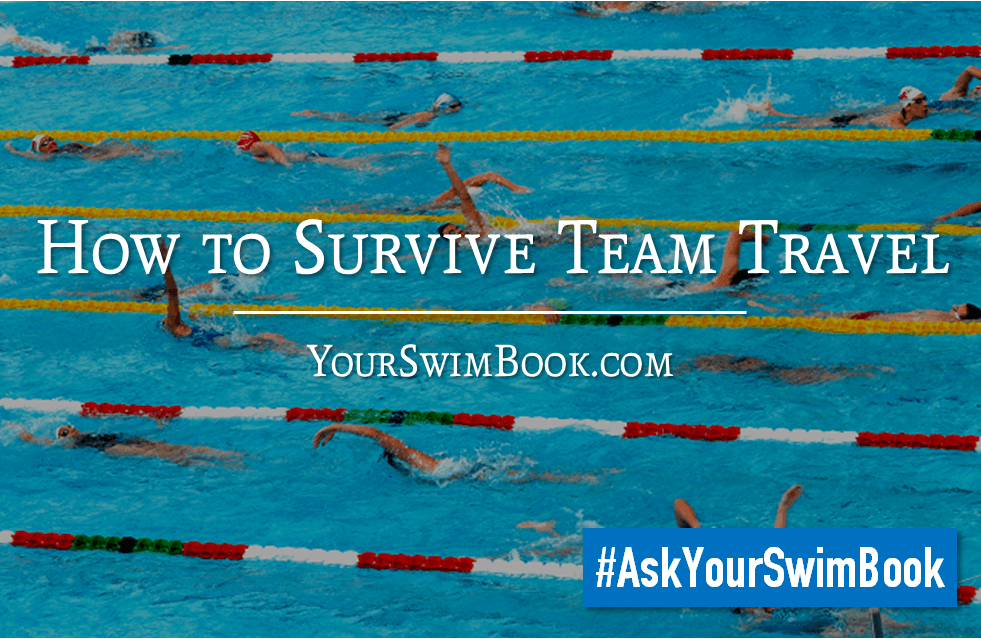Each week I get lots of emails and questions, particularly via the YourSwimBook newsletter, and very frequently I find that a lot of the questions overlap and touch on the same themes. Which made me realize that if some of you are struggling with the things you are writing in about, there is a larger silent majority that are as well.
In response to this, we are putting together a little column on YourSwimBook.com called #AskYourSwimBook.
It’s simple: send me your questions, and I will answer ‘em.
The first question comes from Jessica L., who wonders about something that many swimmers struggle with over the course of their careers in the pool: how to perform optimally despite being far from home.
[alert style=”grey”]I was wondering why is team travel so hard at swim meets (sleeping in hotels, etc) and how can I make it easier for me so that I can still swim fast on the road? — Jessica L.[/alert]
Swimmers understand how much of a commitment the sport is. The long hours of training, the investment of thousands of sessions in the pool in the hopes of seeing a drop of a second or two come race-time, and of course, the reason we hone our skills in the water…
The swim meet.
For those of us who live far from the bustling metropolis’ of swimming, this means road trips, hotels, and long weekends spent in unfamiliar aquatic centers sometimes very, very far from home.
So how can we make sure that all that hard work doesn’t go to waste on account of crappy hotel beds, unfamiliar foods that leave us feeling sluggish, and foreign waters?
Here are 4 ideas:
1. Pack Accordingly.
This might seem obvious, but it bears noting nonetheless. Having your gear for the meet packed ahead of time, with spares of the important stuff, means you don’t have to run around an unfamiliar town or city to find a racing suit or new goggles.
Double up on the mission-critical stuff: goggles, caps, suit.
Pack snacks. Having food on hand that you typically eat at home with you will help keep some of that routine and familiarity while on the road.
2. Get a Lay of the Land.
If you are not big into surprises, and are the kind of swimmer that squirms at the thought of having to surround yourself in uncomfortable new situations, do some pre-meet recon.
Ideally if you are going away for a full weekend of swimming out-of-town you will get a chance to preview the pool before competition kicks off.
If you can, the night before the meet begins jump in and swim a few laps. Try out the starting blocks. Walk through the locker rooms. Where the water fountain is. Where you will park your gear and loosen up before warm-up.
3. Optimize your hotel experience.
One of my favorite parts of traveling to meets as a kid was getting billeted with a host family.
Often we were paired up with families who had kids that matched our age, meaning that we (usually) made some new friends, while getting to sleep in real beds and eat homemade meals.
Getting billetted (and returning the favor when their club came to town) also had the under-appreciated effect of bringing the swimming community together as a whole closer.
As we got older, and the billet model faded (although I would hope that this model is still going strong in some parts of the swimming community), we stayed more and more often in hotels.
Whether it was splitting a room with a half dozen swimmers, sharing a bed with a teammate who kept us awake all night snoring and twitching, or trying to sleep with the iron frame of the pull out couch jabbing into your back, we have all had less than great hotel experiences.
While you cannot always control the firmness of the bed, or the snoriness of your roommate, there are some things you can do to make the hotel experience a little more comfortable.
After all, being rested and able to recuperate between your races is critical, especially over the course of a full weekend of swimming.
Here are a few easy ways to optimize your hotel experience:
Pack your pillow. Seems silly, but something as simple as your own pillow from home can give you that feeling of being in your own bed that can help you doze off easier. If you have a stuffed animal you sleep with (no judgement from me) pack the little fella as well.
Keep the same routine you have at home. Each night before you go to bed you typically perform a ritual of sorts, even if it is not completely conscious. You brush your teeth, throw your clothes in the hamper, read in bed for a few minutes, and then kill the lights. Replicate this ritual while you are on the road as well.
Bring some of your usual snacks along. While meals and snacks should be provided or arranged for you on the road (I am talking mostly to you age groupers), have some snacks packed for the gaps between meals and for after your races. Some almonds, fruit, granola bars, etc. are easy ways to keep you satiated between meals, while also providing a taste of home.
White noise. While this isn’t always possible as you are likely to be bunked up with teammates, having a little fan in the corner of the room can be helpful to drown out the noise of the city outside, or the noisy couple down the hall. Conversely, if white noise isn’t an option, and you know that you are going to have a chainsaw sleeping in your hotel room, pack some ear plugs.
Have dedicated rest and relaxation rooms between sessions. After each preliminaries sessions there was always a group of swimmers who didn’t qualify for finals that night, meaning that they wouldn’t be bedding down between sessions. Have rooms specifically for the athletes who need to shut it down for a nap between sessions so that they can get the rest they need.
4. Let go of expectations.
My last piece of advice to you Jessica is to let go of expectations.
This might seem counter-intuitive, particularly given that I spent the last 3 points essentially describing how to better control what will be largely uncontrollable circumstances.
After all…
You can’t control how the competition will perform.
Or how crowded the warm up pool will be.
But you can control the way you react to these circumstances.
You can choose to get stressed out, distracted, and thrown off.
Or you can choose to to focus your energy and attention inwards.
Open yourself up to the good and the bad, accept the circumstances that come your way, knowing that you have done all you can to prepare for your competition, completed the work, put in the miles, and now it is simply time to let it all go and swim fast.
Forget controlling every aspect of your surroundings, take a deep breath, and enjoy the moment, my dudette.
Got a question about swimming you would like answered?
You can either sign up for our weekly motivational newsletter and get in touch with me there (it’s free—you can sign up here), or send me your question via Twitter (@yourswimbook).












